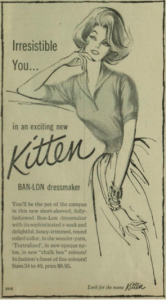This week, the Gazette published an article on gender stereotypes in children’s advertising. We are no strangers to this subject: we’ve reported on the negative effects of gender stereotyping in the media in the past—and we’ve been guilty of running more than a few stereotypical ads ourselves over the years. The following are a few snapshots of our highs and lows.
“Stop sulking, producer tells women at debate” Reem Meshal – Volume, 120, Issue 10 – November 19, 1987
Addressing the issue of women in the media, Ron Crocker, Executive Producer at CBC, urged women to “stop sulking” and use what power they have gained to advance their own causes.
The debate held at Henson College featured a panel of four prominent members of the media. The panel, consisting of two males (Crocker and Doug MacKay, editor of the Daily News) and two females (Sharon Fraser, editor of Atlantic Insight, and Judy Steed, features writer for the Globe and Mail), was predictably divided along lines of gender.
Stereotyping and role-casting of women in the media are rampant, said Steed and Fraser. Citing the case of a young woman murdered in Ontario, Fraser expressed indignation that the story gave undue emphasis to the girl’s attire, a pink angora sweater and tight jeans. In reply to Fraser, one producer said the story had “sex appeal.”
In a tasteless and grotesque fashion spread in the Globe and Mail, a woman was depicted lying dead in a tub wearing a red silk dress as a man washed blood off his hands nearby. Steed said the spread glamorized violence against women, not sex appeal.
In addition to questioning equal opportunity in the workplace, Fraser and Steed reiterated the lack of responsible media coverage of women’s issues. Their complaints centred on the exclusion of women in the chronicling of day-to-day news
(…)
Taking offence to Crocker’s advice for women to “stop sulking”, Steed said he implied the legitimate complaints of women are somehow petty. As for the accusation that she covers too many women’s issues, she said, “I’ve never had anyone tell me I was doing too many stories on men.”
“Sexism Sells” – Volume 109, Issue 9 – November 4, 1976
To attract customers to their stores, owners should “reinforce the stereotypical roles of both men and women in their advertising”, a speaker at a workshop on retail advertising told a recent gathering of retail executives.
In “successful advertising,” according to the speaker, advertising executive William Huckabee, “men act and women appear.”
“’La Goddess’ ads are sexist” – Marie LeBlanc – Volume 123, Issue 10 – November 15th, 1990
Word has that the Ontario NDP is planning to take strong measures against sexism in media advertising.
In response to criticism that the Ontario government is intentionally allowing breweries to promote their beer with sexist advertising, the Globe and Mail newspaper has reported that breweries are anxiously awaiting the Ontario New Democratic Party’s view.
For several years now beer advertisers have been criticised for their sexist commercials. This led to advertisers being “put on notice” by the Canadian Radio and Television Commission this year. In a circular on alcoholic beverage advertising, Canada’s broadcasting regulatory body stated, “Some broadcasters have expressed concern about what is perceived as a growing trend to portray sexuality in broadcast advertising.”
This note from the CRTC was initiated by a request from the Canadian Broadcasting Corporation, which considers itself much stricter on issues of sexism than the privately owned networks.
It is not uncommon to find the CBC asking for changes in beer commercials on the basis of female exploitation, even after it has passed CRTC regulations. Proof of their commitment is CBC’s statement earlier this year that it would not air certain Labatt’s commercials without some changes.
One of the controversial spots in question depicts a young man planning a “chance meeting” with a woman in a crowded bar. He goes on to explain this anticipated encounter as if it were a football play, complete with a playback and play-by-play announcer.
In defence of their ad, the Labatt’s advertising manager for the Atlantic region stated, “In developing this commercial it was our intent to avoid a sexist ending.” This is why the woman at the end of the commercial says “I’ll think about it.” They feel this clearly states the woman’s rights.
Moosehead breweries, who had been running commercials people with swimsuit clad beauties for over a year, pulled them in December of last year. The timing coincided with the Montreal Massacre, and with heightened sensitivity to sexism and violence directed at women.
The removal of the commercial was said to be because, “Moosehead did not want to contribute to anything of that sort.”
Commercials such as the Labatt’s ones depicting women as “La Babe”, though perhaps not as overtly sexist and offensive as many other things, are regarded as promoting negative stereotypes of women.



Recent Comments